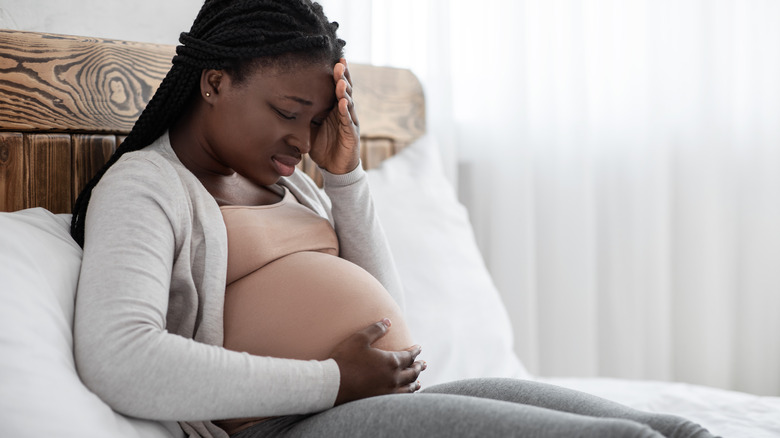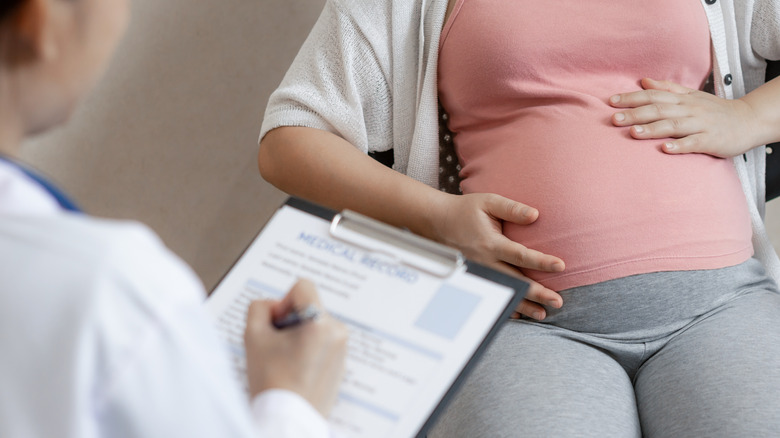Is It Safe To Undergo Chemotherapy When Pregnant?
Being diagnosed with cancer while pregnant can feel not only devastating, but utterly confusing. It can be hard to know how it will impact your pregnancy and what's safe or unsafe for your baby. Cancer treatments like chemotherapy may seem impossible to undergo while pregnant, but if done at the correct time, it may still be a safe treatment for both you and your baby.
Chemotherapy simply means that cancer is being treated with the use of drugs, according to the National Cancer Institute. It works by slowing or killing cancer cells in the body, although this means it can also slow and kill healthy cells, which can lead to complications.
There are many different kinds of drugs that can be used, and they can either be used on their own or in combination with others. Chemotherapy can also be given in many different ways, such as through a pill or liquid that you swallow, an injection in your muscle, an IV (intravenous) into your bloodstream, or a cream that you massage into your skin.
The most common method is through an IV, or a small needle that is placed directly into a vein in your arm or hand. The type of drug you get, the method for receiving it, and how long your treatment will last will depend on the kind of cancer you have, how far it has progressed, any prior experience with chemotherapy, and any other health issues you may have, such as diabetes. But what role does pregnancy play in chemotherapy?
How chemotherapy can impact pregnancy
Side effects of chemo can vary, as some are mild and some can cause serious complications (via Mayo Clinic). Common side effects that can be treated include fatigue, nausea, loss of appetite, vomiting, hair loss, fever, constipation, easy bruising, and bleeding. More serious and long-lasting potential side effects include heart problems, lung tissue damage, kidney problems, infertility, and nerve damage.
If you're pregnant, you not only have to think about how the side effects will impact you, but how the drugs themselves will impact your baby. Chemo drugs can have an effect on the baby's developing organs in the first trimester, according to Moffitt Cancer Center. During the first trimester, or first three months of pregnancy, the baby's organs are still developing.
If cancer needs to be treated in the first trimester, doctors will typically try to remove any tumors surgically first, and wait until the second or third trimesters to use chemotherapy. At that stage of pregnancy, chemotherapy is generally considered to be safe since the baby's organs will be developed by then.
The safety profiles of many other treatments aren't clear
There's still much to be known about the impact of newer cancer treatments on pregnant people, according to the National Cancer Institute. Those who are pregnant are usually excluded from clinical trials to keep them and their babies safe. But this means that we often don't know how someone who is pregnant will respond to newer treatments.
While chemo is often used in the second and third trimesters, a 2022 case study published in the American Journal of Hematology showed that a pregnant person was treated with immunotherapy for her diagnosis of lymphoma, one of the most common types of cancer to occur during pregnancy.
Immunotherapy works by helping the immune system to fight cancer cells. More research is needed to establish the safety of immunotherapy and other new cancer treatments for pregnant people whose cancers don't respond to chemotherapy.
Chemotherapy, however, is typically considered safe after the first trimester, although more research is needed to confirm whether or not there might be any long-term side effects.
It's generally recommended to stop chemotherapy treatments about eight weeks before your due date (via Moffitt Cancer Center). This is because chemotherapy lowers your white blood cell count and impairs your immune system, which puts you and your baby at higher risk for infection during delivery. Your doctor will help you decide what's necessary to both treat your cancer and keep your baby safe.



